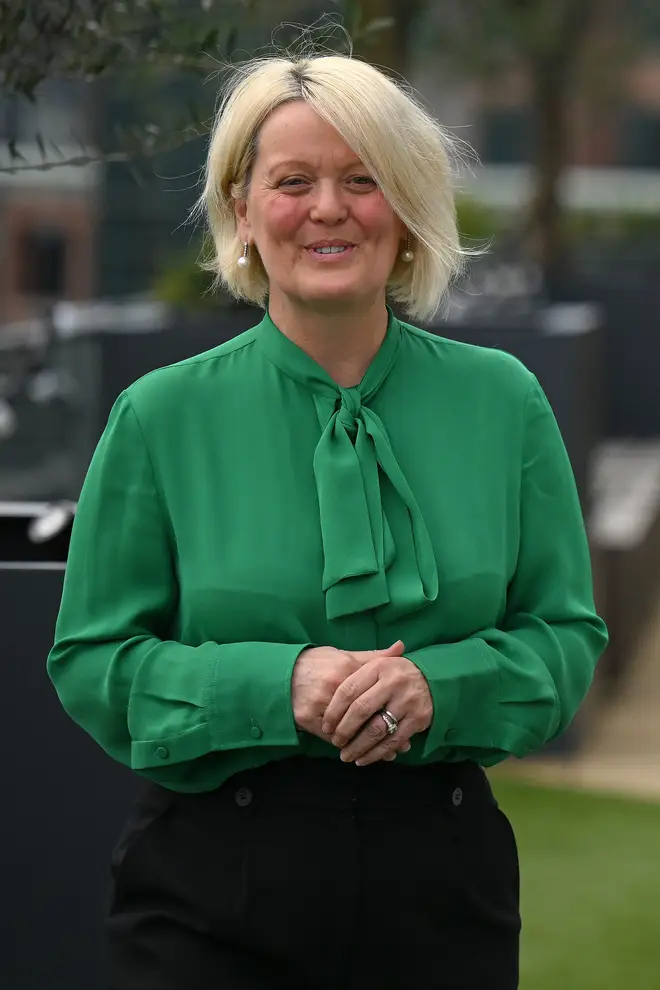
Tom Swarbrick 4pm - 7pm
23 August 2023, 23:30 | Updated: 24 August 2023, 00:35

NatWest is under pressure to halt a £2.4m payout to former boss Dame Alison Rose, who quit over the handling of the closure of Nigel Farage’s bank account last month.
The banking giant has said it will continue to review her planned pay and bonus payouts in relation to ongoing investigations into her actions surrounding a row over Mr Farage's account.
Ms Rose led the company for four years as chief executive officer but stepped down on July 25 following the row over the closure of former Ukip leader Mr Farage's account with Coutts, the private bank run by NatWest.
She resigned after she admitted to being the source of an inaccurate story about Mr Farage's finances following a discussion with a BBC journalist.
Ms Rose is currently seeing out her 12-month notice period with the banking group.

The firm announced today it will pay her £1.155 million in salary for the year, £1.155 million in NatWest shares - which she will receive over a five-year period - and £115,566 in pension payments. The pay deal totals around £2.43 million.
But Mr Farage and several senior Conservative MPs voiced their opposition to the bumper pay deal for Ms Rose.
Mr Farage branded the payout "a sick joke."
The former Brexit Party leader added: "Surely you can’t break client confidentiality, surely you can’t breach virtually every important rule in the FCA codebook, and you can’t then lie about it after you’ve briefed the BBC and still receive a £2.43m payout, and yet that’s exactly what’s happened to Alison Rose."
Former Brexit secretary David Davis said: "If a junior employee had breached bank confidentiality, they would have been out on their ear with no pay whatsoever."
He went on: "Frankly, the board should have blocked this and if the board was not willing to do it, the largest shareholder, which happens to be the Treasury, should have stepped in and said it is unacceptable."

Natwest said in a statement on Wednesday: "Ms Rose's notice period and the payments she will continue to receive for the notice period will be reviewed on a continuing basis, having regard to the internal and external investigations relating to the account closure arrangements at Coutts and associated events.
"Decisions on these awards, along with any decisions regarding other remuneration matters, will be made taking into account the findings of the investigations, as appropriate."
It added that policies allowing the company to potentially "claw back" bonus payments will apply to the former boss.

Former Brexit Party MEP states NatWest boss 'had a very silly moment' leaking Farage's bank details
Harriet Baldwin, the Conservative MP and chairperson of the Treasury Select Committee, said: "I think the remuneration committee of the board will want to look closely at this for the two departed CEOs when the external investigation is completed as some of the compensation will continue to be subject to claw back.”
Ms Rose admitted last month to making "a serious error of judgment" by discussing Mr Farage's bank account at Coutts with a journalist.
NatWest Group chairman Sir Howard Davies said in July: "The Board and Alison Rose have agreed, by mutual consent, that she will step down as CEO of the NatWest Group. It is a sad moment.

"She has dedicated all her working life so far to NatWest and will leave many colleagues who respect and admire her."
In her own resignation statement, Dame Alison thanked her colleagues "for all that they have done", adding: "I remain immensely proud of the progress the bank has made in supporting people, families and business across the UK, and building the foundations for sustainable growth."

Columnist for The Telegraph, Simon Heffer calls for NatWest boss's resignation.
The controversy came after Mr Farage presented a 40-page dossier, showing that his Coutts account had been closed partly due to his political views conflicting with the bank's values.
Mr Farage, the founder of the Brexit Party, was a key driving force behind the UK leaving the European Union, and has repeatedly called for lower immigration. These views put him at odds with much of the country, although he also has many supporters.
The evidence, which he got from the bank itself through a data request, contradicted a BBC News story that said Mr Farage's account was closed because he didn't meet the £1 million threshold to bank with Coutts.
The BBC and its business editor Simon Jack apologised, saying the reporting had been based on information from a "trusted and senior source" but "turned out to be incomplete and inaccurate".
Apologising earlier, Dame Alison said she thought the information was already in the public domain.
She said she had not revealed “any personal financial information” about Mr Farage but admitted: “I left Mr Jack with the impression that the decision to close Mr Farage’s accounts was solely a commercial one.
"Put simply, I was wrong to respond to any question raised by the BBC about this case. I want to extend my sincere apologies to Mr Farage for the personal hurt this has caused him."
Sir Howard said the "overall handling of the circumstances surrounding Mr Farage's accounts had been unsatisfactory, with serious consequences for the bank", before promising an independent review, which will be made public.
Sheldon Mills, Financial Conduct Authority (FCA) executive director for consumers and competition, said it had raised concerns about breaches of confidentiality by Coutts and its parent company NatWest.
He also emphasised the importance of a "well-resourced" independent review to investigate the matter "swiftly" and "fully", adding: "On the basis of the review and any steps taken by other authorities, such as the Financial Ombudsman Service or Information Commissioner, on relevant complaints, we will decide if any further action is necessary."
Several Conservative MPs, including Sir Jacob Rees Mogg, had already called on Dame Alison to go. Downing Street had also voiced "significant concerns" about the incident.
The government owns close to 39% of NatWest, after a bailout in the 2008 financial crisis. The government was the majority shareholder until March last year.